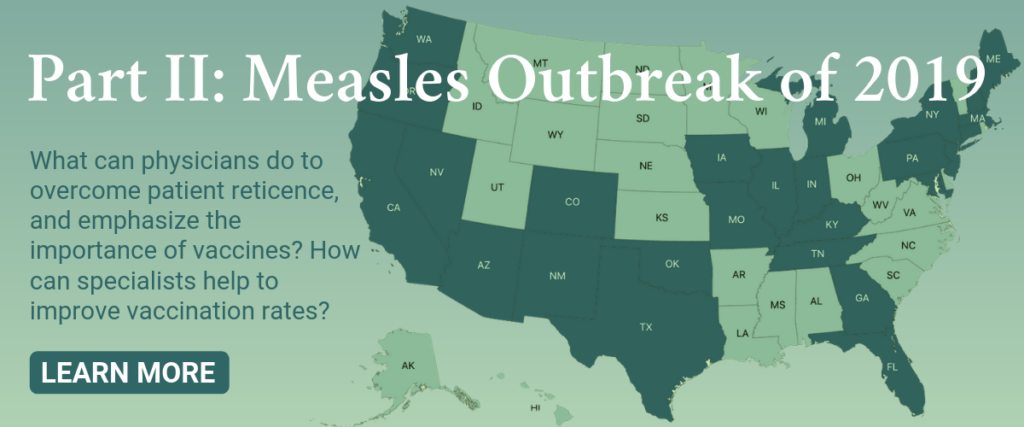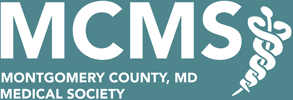
Measles in Maryland – Part II
This is the second of a series of articles on the U.S. measles outbreak of 2019. This installment will focus on clinical guidance, continuing medical education, and provide resources related to patient vaccine reticence and raising vaccine awareness among the public.
For information on Maryland modifications to measles recommendations, in light of the outbreak, and the scale, sourcing, and spread that has precipitated the resurgence of a disease declared eliminated in 2000, visit the first article in this series
Updated Measles FAQ for Clinicians in Maryland
Maryland Department of Health (MDH), in addition to releasing a letter to clinicians which contains updated recommendations about measles vaccinations in special situations, and emphasizes important guidance for clinicians who might encounter patients exposed to measles or with suspected measles, has released an updated FAQ for clinicians with clinical guidance, HCP recommendations, isolation and testing recommendations, and more.
The measles outbreak in Maryland remains localized to zip codes 21208, 21209 and 21215. Please check the MDH website health.maryland.gov/measles for the most up-to-date information on the outbreak.
Continuing Medical Education on Vaccinations
It’s never too early – or too late – to refresh the clinical staff at your practice on vaccine best practices. The Centers for Disease Control (CDC) has a free, on-demand CME module on Measles, Mumps, and Rubella. Access it here.
Beginning at noon on June 5, 2019, the CDC will host an online series of 15 webinars providing an overview of the principles of vaccination, general recommendations, immunization strategies for providers, and specific information about vaccine-preventable diseases and the vaccines that prevent them. Each one-hour webinar explores a chapter from the 13th edition of “Epidemiology and Prevention of Vaccine-Preventable Diseases,” also known widely as “The Pink Book.” These webinar are provided at no cost and accredited with continuing education credits for physicians, PAs, NPs, nurses, and other allied health professionals. Click here to access the educational series, or download The Pink Book.
Patient Education & Outreach
Conversations with Parents
Many parents don’t have questions about vaccines when clinicians give their strong recommendation and use language that assumes parents will accept vaccines for their child. If a parent questions recommendations, this does not necessarily mean they will not accept vaccines. These resources outline strategies for talking through topics most asked about by parents.
- Guidance for Talking with Parents about Vaccines
- Tips for Preparing for Questions Parents may Ask about Vaccines
- Vaccine safety fact sheets, such as Understanding Thimerosal, Mercury, and Vaccine Safety
Resources to Share with Parents
Providing parents with printed materials can help them to understand the recommended immunization schedule for their child and the risks associated with noncompliance.
- Parent-friendly immunization schedule for children ages 0-6
- Fact Sheet: Infant Immunization FAQs
- Fact Sheet: If You Choose Not to Vaccinate Your Child, Understand the Risks and Responsibilities
- Infographic: Measles: It Isn’t Just a Little Rash
- Fact Sheet: Tips for a Less Stressful Shot Visit
- Infographic: Illustrated list of Six Reasons to Follow CDC’s Immunization Schedule
- Fact sheet: Measles and the Vaccine (Shot) to Prevent It
- Fact Sheet: Vaccines When Your Child Is Sick
The CDC also has equivalent materials available in Spanish.
Posters for Your Office
Is there a resource or strategy for talking to patients about the importance of vaccination that should be listed here? Please send them to us by email or fax (301.921.4368.)
The Measles & Rubella Initiative
The total number of measles cases spiked 300% globally over the last year. The Measles & Rubella Initiative (M&RI) is a global partnership to lead and coordinate efforts to achieve a world without measles and rubella.
M&RI is led by the American Red Cross, the United Nations Foundation, the U.S. Centers for Disease Control and Prevention, UNICEF and the World Health Organization. It aims to reach the measles and rubella elimination goals of the Global Vaccine Action Plan by supporting countries to raise coverage of measles, rubella and other vaccines; fund, plan, implement and monitor quality supplementary campaigns; investigate outbreaks and provide technical and financial support for effective outbreak response, propose and participate in solutions to strengthen immunization delivery; and support a global laboratory network for measles and rubella. Find out how you can get involved.
Resources & Further Reading:
- Maryland Department of Health’s Measles Resource Center
- The Pink Book from the CDC
- “The Other Reasons Kids Aren’t Getting Vaccinations: Poverty And Health Care Access” from NPR
- “Viewpoints: Wiping Out Measles Again Means Focusing on Parent in Developing Countries” from Bloomberg
- “How Public Health Outreach Ended A 1990s Measles Outbreak and What’s Different Now” from NPR
- “Rare and Eradicated Diseases Making a Resurgence in the U.S.” from The DO
- “Mumps: The Disease, The Vaccine, The Problem” from the 2 Docs Talk Podcast
- “Measles | Cases and Outbreaks | CDC” from Centers for Disease Control and Prevention
